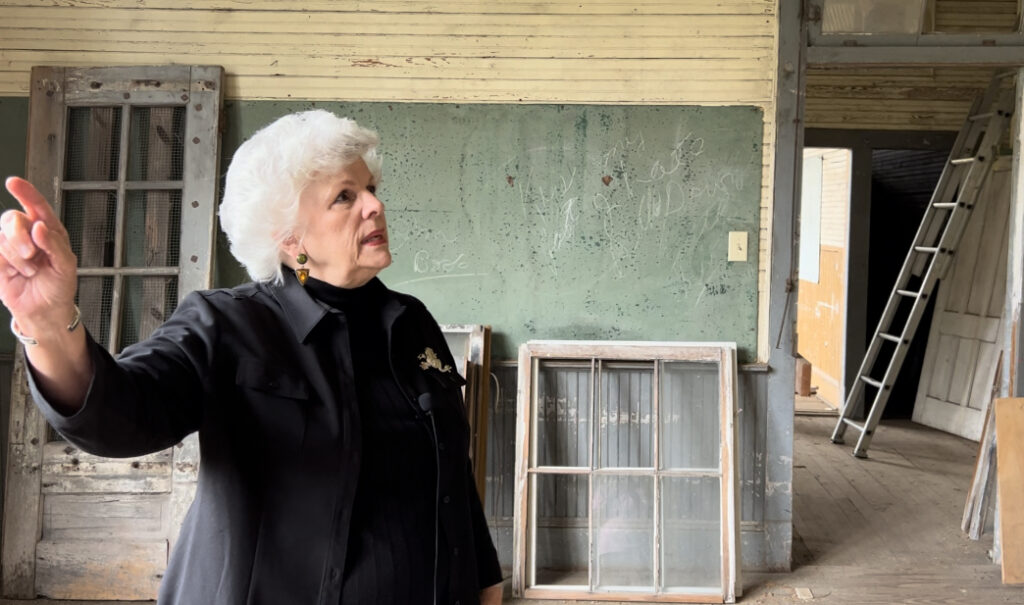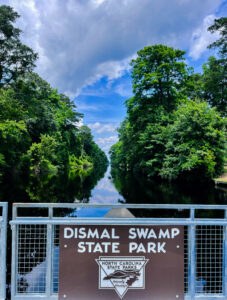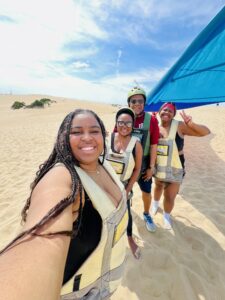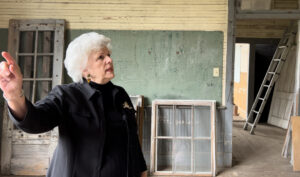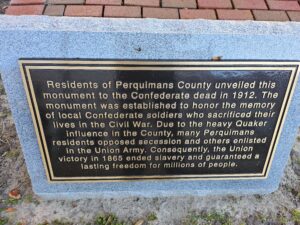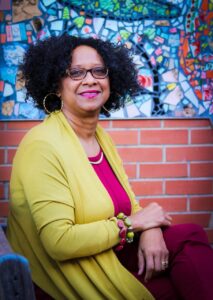By Amy Beth Wright
 Charlotte Griffin has been the mayor of Bear Grass, North Carolina, population 84, for more than 20 years. In 2010, as part of the board of the Roanoke River Partners’, a nonprofit organization that has developed a paddling and camping trail and an economically thriving cultural heritage corridor along 146 miles of the Roanoke River in North Carolina, Griffith championed efforts to restore the Hamilton Rosenwald school site in Hamilton, North Carolina as the Rosenwald River Center. After a lifetime of recognizing the river’s importance to Martin County’s cultural history—particularly integral to National Underground Railroad Network to Freedom—Griffith describes this project as “a beautiful way of helping carry forward the history and importance of the Rosenwald schools to the area, and what that meant.”
Charlotte Griffin has been the mayor of Bear Grass, North Carolina, population 84, for more than 20 years. In 2010, as part of the board of the Roanoke River Partners’, a nonprofit organization that has developed a paddling and camping trail and an economically thriving cultural heritage corridor along 146 miles of the Roanoke River in North Carolina, Griffith championed efforts to restore the Hamilton Rosenwald school site in Hamilton, North Carolina as the Rosenwald River Center. After a lifetime of recognizing the river’s importance to Martin County’s cultural history—particularly integral to National Underground Railroad Network to Freedom—Griffith describes this project as “a beautiful way of helping carry forward the history and importance of the Rosenwald schools to the area, and what that meant.”
What led to the Roanoke River Partners’ decision to take on stewardship and preservation of the Hamilton Rosenwald School?
In May of 2007, The National Trust for Historic Preservation inquired if we had an interest in acquiring the building, and we decided to purchase it. It was in better shape than many original Rosenwald schools, and we could preserve many artifacts while creating a community center and event venue.
Our retired project coordinator and former director is a diversity scholar with the National Trust for Historic Preservation. We presented this project at the first and second National Rosenwald Conferences, the first in 2012 at Tuskegee University and then in 2015 at the Durham Convention Center, all in cooperation with the National Trust. So, this project has been on our heart for a good while. It allows us to present the Rosenwald schools’ importance to this region alongside the river history, which is so much a part of the life and occupations of the people in this area. All of that is a story that’s worthy of being told and so at this point, that’s my passion, to get that story told.
Since 2007, what have been some keystone achievements?
Way back, before COVID, we went to Mississippi for the national meeting of the National Trust for Historic Preservation; we were part of their program that year, for what we were attempting to do. We were trying to not only preserve the school, but to create our office and a large meeting space and an extensive repository of historic artifacts, printed materials, and oral histories that talk about the school itself, the river history, the Underground Railroad Network to Freedom—it’s a compilation of things to be done, and the key thing was to preserve it.
What was the condition of the school in 2007? When was the last time anybody had been inside?
Some windows were exposed to the weather and the roof was in bad shape. So we got a Lowe’s Community Grant and put a new roof on it. And, some windows had to be custom done to seal the building from weather concerns. We painted it, though it’s needing that badly again. It had been purchased by a Hamilton resident as a storage warehouse, then another individual purchased it from him and it sat empty for a good long time. Another individual purchased it with plans to restore it as a house. We never found out what happened, but the next thing we knew, The National Trust acquired it from him. It sat empty for maybe three to five years, and they came to us about it.
Will the new center offer interpretation about the school’s social and cultural history?
We envision a historic renovation that will allow people to visit an authentic Rosenwald school setting. A lot is just as it was then, even the blackboards, and we intend to preserve that alongside the printed materials, oral histories, and video interviews; we currently have interviews with three wonderful ladies who attended the school, with them talking about it and singing. We will incorporate educational components, not only of the Rosenwald schools movement, but also the Roanoke River as part of the National Underground Railroad Network to Freedom. We’ve been recognized with that designation since 2008. If we can get this thing open, we’re ready to put the stuff in there and roll.
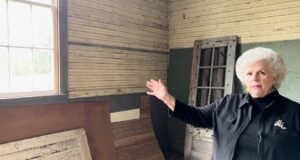
On a personal level, why is this project important to you?
I view it as preserving the history of the area, and the history of the people in that community. I was born and raised in Martin County, and my family has been here over 200 years. Every community has a history. This is an opportunity for us to help preserve a portion of history while at the same time drawing attention to all the things that made it so important. It’s an educational piece for future generations as far as I’m concerned, as our children don’t have all the connections to history that maybe they should have. This is another opportunity to do that.
What impact do you perceive the Rosenwald schools had in northeast North Carolina and the South at large?
Julius Rosenwald was the president of Sears Roebuck, and he worked with Booker T. Washington at Tuskegee to get this movement underway at a time that African American students often didn’t have availability to education. This project had a massive impact, because not only were those students being educated, they were learning life skills and trades. Many of that next generation became great leaders—we had judges, doctors, lawyers and all sorts of professions come from the Rosenwald schools. It’s amazing as well the things that were incorporated into the buildings themselves, which were designed for efficiency, economy, lighting, heating, and so on. And then you had a trade part and educational part; it was amazing really.
What are some reflections when you consider the path to get here?
It’s been a long journey. We’ve been working on this since 2007 when we acquired the property, and it was a struggle to get other people interested and contributing to get it moving forward. Everybody doesn’t always see the benefit. And it’s truly a cultural heritage, an economic development, a contributor to making the whole region better and more productive. It’s about history, culture, the contributions it made to society and the contribution it can make going forward. It will bring people in and preserve the school’s and students’ history, while sharing riverine history and science. It will be a truly great site, I think, once we get it finished.
Read more here about the Rosenwald River Center, including video interviews with school alumni and the river’s role in the Underground Railroad Network to Freedom.

